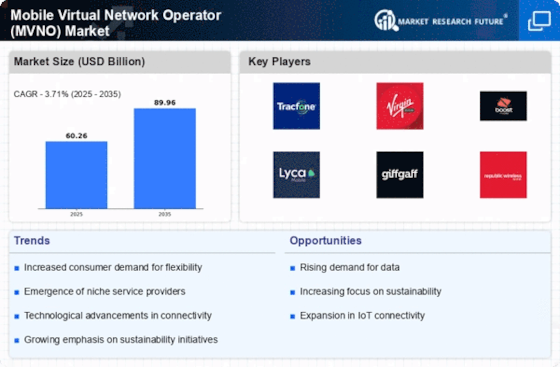-
EXECUTIVE SUMMARY
-
Market Overview
-
Key Findings
-
Market Segmentation
-
Competitive Landscape
-
Challenges and Opportunities
-
Future Outlook
-
MARKET INTRODUCTION
-
Definition
-
Scope of the study
- Research Objective
- Assumption
- Limitations
-
RESEARCH METHODOLOGY
-
Overview
-
Data Mining
-
Secondary Research
-
Primary Research
- Primary Interviews and Information Gathering Process
- Breakdown of Primary Respondents
-
Forecasting Model
-
Market Size Estimation
- Bottom-Up Approach
- Top-Down Approach
-
Data Triangulation
-
Validation
-
MARKET DYNAMICS
-
Overview
-
Drivers
-
Restraints
-
Opportunities
-
MARKET FACTOR ANALYSIS
-
Value chain Analysis
-
Porter's Five Forces Analysis
- Bargaining Power of Suppliers
- Bargaining Power of Buyers
- Threat of New Entrants
- Threat of Substitutes
- Intensity of Rivalry
-
COVID-19 Impact Analysis
- Market Impact Analysis
- Regional Impact
- Opportunity and Threat Analysis
-
Mobile Virtual Network Operator (MVNO) Market, BY Business Model (USD Billion)
-
Discount MVNO
-
Functional MVNO
-
Brand MVNO
-
Niche MVNO
-
Mobile Virtual Network Operator (MVNO) Market, BY Service Type (USD Billion)
-
Prepaid Services
-
Postpaid Services
-
Data-Only Services
-
Voice-Only Services
-
Mobile Virtual Network Operator (MVNO) Market, BY Customer Segment (USD Billion)
-
Individual Consumers
-
Small and Medium Enterprises
-
Large Enterprises
-
Government
-
Mobile Virtual Network Operator (MVNO) Market, BY Network Infrastructure (USD Billion)
-
Full MVNO
-
Light MVNO
-
Thin MVNO
-
Mobile Virtual Network Operator (MVNO) Market, BY Regional (USD Billion)
-
North America
- US
- Canada
-
Europe
- Germany
- UK
- France
- Russia
- Italy
- Spain
- Rest of Europe
-
APAC
- China
- India
- Japan
- South Korea
- Malaysia
- Thailand
- Indonesia
- Rest of APAC
-
South America
- Brazil
- Mexico
- Argentina
- Rest of South America
-
MEA
- GCC Countries
- South Africa
- Rest of MEA
-
Competitive Landscape
-
Overview
-
Competitive Analysis
-
Market share Analysis
-
Major Growth Strategy in the Mobile Virtual Network Operator (MVNO) Market
-
Competitive Benchmarking
-
Leading Players in Terms of Number of Developments in the Mobile Virtual Network Operator (MVNO) Market
-
Key developments and growth strategies
- New Product Launch/Service Deployment
- Merger & Acquisitions
- Joint Ventures
-
Major Players Financial Matrix
- Sales and Operating Income
- Major Players R&D Expenditure. 2023
-
Company Profiles
-
TMobile
- Financial Overview
- Products Offered
- Key Developments
- SWOT Analysis
- Key Strategies
-
TracFone Wireless
- Financial Overview
- Products Offered
- Key Developments
- SWOT Analysis
- Key Strategies
-
Dodo
- Financial Overview
- Products Offered
- Key Developments
- SWOT Analysis
- Key Strategies
-
Society Wireless
- Financial Overview
- Products Offered
- Key Developments
- SWOT Analysis
- Key Strategies
-
AT and T
- Financial Overview
- Products Offered
- Key Developments
- SWOT Analysis
- Key Strategies
-
Virgin Mobile
- Financial Overview
- Products Offered
- Key Developments
- SWOT Analysis
- Key Strategies
-
Google Fi
- Financial Overview
- Products Offered
- Key Developments
- SWOT Analysis
- Key Strategies
-
Verizon Communications
- Financial Overview
- Products Offered
- Key Developments
- SWOT Analysis
- Key Strategies
-
Sprint Corporation
- Financial Overview
- Products Offered
- Key Developments
- SWOT Analysis
- Key Strategies
-
Amaysim
- Financial Overview
- Products Offered
- Key Developments
- SWOT Analysis
- Key Strategies
-
Metro by TMobile
- Financial Overview
- Products Offered
- Key Developments
- SWOT Analysis
- Key Strategies
-
Boost Mobile
- Financial Overview
- Products Offered
- Key Developments
- SWOT Analysis
- Key Strategies
-
Giffgaff
- Financial Overview
- Products Offered
- Key Developments
- SWOT Analysis
- Key Strategies
-
Lycamobile
- Financial Overview
- Products Offered
- Key Developments
- SWOT Analysis
- Key Strategies
-
Consumer Cellular
- Financial Overview
- Products Offered
- Key Developments
- SWOT Analysis
- Key Strategies
-
Appendix
-
References
-
Related Reports
-
LIST Of tables
-
LIST OF ASSUMPTIONS
-
North America Mobile Virtual Network Operator (MVNO) Market SIZE ESTIMATES & FORECAST, BY BUSINESS MODEL, 2019-2035 (USD Billions)
-
North America Mobile Virtual Network Operator (MVNO) Market SIZE ESTIMATES & FORECAST, BY SERVICE TYPE, 2019-2035 (USD Billions)
-
North America Mobile Virtual Network Operator (MVNO) Market SIZE ESTIMATES & FORECAST, BY CUSTOMER SEGMENT, 2019-2035 (USD Billions)
-
North America Mobile Virtual Network Operator (MVNO) Market SIZE ESTIMATES & FORECAST, BY NETWORK INFRASTRUCTURE, 2019-2035 (USD Billions)
-
North America Mobile Virtual Network Operator (MVNO) Market SIZE ESTIMATES & FORECAST, BY REGIONAL, 2019-2035 (USD Billions)
-
US Mobile Virtual Network Operator (MVNO) Market SIZE ESTIMATES & FORECAST, BY BUSINESS MODEL, 2019-2035 (USD Billions)
-
US Mobile Virtual Network Operator (MVNO) Market SIZE ESTIMATES & FORECAST, BY SERVICE TYPE, 2019-2035 (USD Billions)
-
US Mobile Virtual Network Operator (MVNO) Market SIZE ESTIMATES & FORECAST, BY CUSTOMER SEGMENT, 2019-2035 (USD Billions)
-
US Mobile Virtual Network Operator (MVNO) Market SIZE ESTIMATES & FORECAST, BY NETWORK INFRASTRUCTURE, 2019-2035 (USD Billions)
-
US Mobile Virtual Network Operator (MVNO) Market SIZE ESTIMATES & FORECAST, BY REGIONAL, 2019-2035 (USD Billions)
-
Canada Mobile Virtual Network Operator (MVNO) Market SIZE ESTIMATES & FORECAST, BY BUSINESS MODEL, 2019-2035 (USD Billions)
-
Canada Mobile Virtual Network Operator (MVNO) Market SIZE ESTIMATES & FORECAST, BY SERVICE TYPE, 2019-2035 (USD Billions)
-
Canada Mobile Virtual Network Operator (MVNO) Market SIZE ESTIMATES & FORECAST, BY CUSTOMER SEGMENT, 2019-2035 (USD Billions)
-
Canada Mobile Virtual Network Operator (MVNO) Market SIZE ESTIMATES & FORECAST, BY NETWORK INFRASTRUCTURE, 2019-2035 (USD Billions)
-
Canada Mobile Virtual Network Operator (MVNO) Market SIZE ESTIMATES & FORECAST, BY REGIONAL, 2019-2035 (USD Billions)
-
Europe Mobile Virtual Network Operator (MVNO) Market SIZE ESTIMATES & FORECAST, BY BUSINESS MODEL, 2019-2035 (USD Billions)
-
Europe Mobile Virtual Network Operator (MVNO) Market SIZE ESTIMATES & FORECAST, BY SERVICE TYPE, 2019-2035 (USD Billions)
-
Europe Mobile Virtual Network Operator (MVNO) Market SIZE ESTIMATES & FORECAST, BY CUSTOMER SEGMENT, 2019-2035 (USD Billions)
-
Europe Mobile Virtual Network Operator (MVNO) Market SIZE ESTIMATES & FORECAST, BY NETWORK INFRASTRUCTURE, 2019-2035 (USD Billions)
-
Europe Mobile Virtual Network Operator (MVNO) Market SIZE ESTIMATES & FORECAST, BY REGIONAL, 2019-2035 (USD Billions)
-
Germany Mobile Virtual Network Operator (MVNO) Market SIZE ESTIMATES & FORECAST, BY BUSINESS MODEL, 2019-2035 (USD Billions)
-
Germany Mobile Virtual Network Operator (MVNO) Market SIZE ESTIMATES & FORECAST, BY SERVICE TYPE, 2019-2035 (USD Billions)
-
Germany Mobile Virtual Network Operator (MVNO) Market SIZE ESTIMATES & FORECAST, BY CUSTOMER SEGMENT, 2019-2035 (USD Billions)
-
Germany Mobile Virtual Network Operator (MVNO) Market SIZE ESTIMATES & FORECAST, BY NETWORK INFRASTRUCTURE, 2019-2035 (USD Billions)
-
Germany Mobile Virtual Network Operator (MVNO) Market SIZE ESTIMATES & FORECAST, BY REGIONAL, 2019-2035 (USD Billions)
-
UK Mobile Virtual Network Operator (MVNO) Market SIZE ESTIMATES & FORECAST, BY BUSINESS MODEL, 2019-2035 (USD Billions)
-
UK Mobile Virtual Network Operator (MVNO) Market SIZE ESTIMATES & FORECAST, BY SERVICE TYPE, 2019-2035 (USD Billions)
-
UK Mobile Virtual Network Operator (MVNO) Market SIZE ESTIMATES & FORECAST, BY CUSTOMER SEGMENT, 2019-2035 (USD Billions)
-
UK Mobile Virtual Network Operator (MVNO) Market SIZE ESTIMATES & FORECAST, BY NETWORK INFRASTRUCTURE, 2019-2035 (USD Billions)
-
UK Mobile Virtual Network Operator (MVNO) Market SIZE ESTIMATES & FORECAST, BY REGIONAL, 2019-2035 (USD Billions)
-
France Mobile Virtual Network Operator (MVNO) Market SIZE ESTIMATES & FORECAST, BY BUSINESS MODEL, 2019-2035 (USD Billions)
-
France Mobile Virtual Network Operator (MVNO) Market SIZE ESTIMATES & FORECAST, BY SERVICE TYPE, 2019-2035 (USD Billions)
-
France Mobile Virtual Network Operator (MVNO) Market SIZE ESTIMATES & FORECAST, BY CUSTOMER SEGMENT, 2019-2035 (USD Billions)
-
France Mobile Virtual Network Operator (MVNO) Market SIZE ESTIMATES & FORECAST, BY NETWORK INFRASTRUCTURE, 2019-2035 (USD Billions)
-
France Mobile Virtual Network Operator (MVNO) Market SIZE ESTIMATES & FORECAST, BY REGIONAL, 2019-2035 (USD Billions)
-
Russia Mobile Virtual Network Operator (MVNO) Market SIZE ESTIMATES & FORECAST, BY BUSINESS MODEL, 2019-2035 (USD Billions)
-
Russia Mobile Virtual Network Operator (MVNO) Market SIZE ESTIMATES & FORECAST, BY SERVICE TYPE, 2019-2035 (USD Billions)
-
Russia Mobile Virtual Network Operator (MVNO) Market SIZE ESTIMATES & FORECAST, BY CUSTOMER SEGMENT, 2019-2035 (USD Billions)
-
Russia Mobile Virtual Network Operator (MVNO) Market SIZE ESTIMATES & FORECAST, BY NETWORK INFRASTRUCTURE, 2019-2035 (USD Billions)
-
Russia Mobile Virtual Network Operator (MVNO) Market SIZE ESTIMATES & FORECAST, BY REGIONAL, 2019-2035 (USD Billions)
-
Italy Mobile Virtual Network Operator (MVNO) Market SIZE ESTIMATES & FORECAST, BY BUSINESS MODEL, 2019-2035 (USD Billions)
-
Italy Mobile Virtual Network Operator (MVNO) Market SIZE ESTIMATES & FORECAST, BY SERVICE TYPE, 2019-2035 (USD Billions)
-
Italy Mobile Virtual Network Operator (MVNO) Market SIZE ESTIMATES & FORECAST, BY CUSTOMER SEGMENT, 2019-2035 (USD Billions)
-
Italy Mobile Virtual Network Operator (MVNO) Market SIZE ESTIMATES & FORECAST, BY NETWORK INFRASTRUCTURE, 2019-2035 (USD Billions)
-
Italy Mobile Virtual Network Operator (MVNO) Market SIZE ESTIMATES & FORECAST, BY REGIONAL, 2019-2035 (USD Billions)
-
Spain Mobile Virtual Network Operator (MVNO) Market SIZE ESTIMATES & FORECAST, BY BUSINESS MODEL, 2019-2035 (USD Billions)
-
Spain Mobile Virtual Network Operator (MVNO) Market SIZE ESTIMATES & FORECAST, BY SERVICE TYPE, 2019-2035 (USD Billions)
-
Spain Mobile Virtual Network Operator (MVNO) Market SIZE ESTIMATES & FORECAST, BY CUSTOMER SEGMENT, 2019-2035 (USD Billions)
-
Spain Mobile Virtual Network Operator (MVNO) Market SIZE ESTIMATES & FORECAST, BY NETWORK INFRASTRUCTURE, 2019-2035 (USD Billions)
-
Spain Mobile Virtual Network Operator (MVNO) Market SIZE ESTIMATES & FORECAST, BY REGIONAL, 2019-2035 (USD Billions)
-
Rest of Europe Mobile Virtual Network Operator (MVNO) Market SIZE ESTIMATES & FORECAST, BY BUSINESS MODEL, 2019-2035 (USD Billions)
-
Rest of Europe Mobile Virtual Network Operator (MVNO) Market SIZE ESTIMATES & FORECAST, BY SERVICE TYPE, 2019-2035 (USD Billions)
-
Rest of Europe Mobile Virtual Network Operator (MVNO) Market SIZE ESTIMATES & FORECAST, BY CUSTOMER SEGMENT, 2019-2035 (USD Billions)
-
Rest of Europe Mobile Virtual Network Operator (MVNO) Market SIZE ESTIMATES & FORECAST, BY NETWORK INFRASTRUCTURE, 2019-2035 (USD Billions)
-
Rest of Europe Mobile Virtual Network Operator (MVNO) Market SIZE ESTIMATES & FORECAST, BY REGIONAL, 2019-2035 (USD Billions)
-
APAC Mobile Virtual Network Operator (MVNO) Market SIZE ESTIMATES & FORECAST, BY BUSINESS MODEL, 2019-2035 (USD Billions)
-
APAC Mobile Virtual Network Operator (MVNO) Market SIZE ESTIMATES & FORECAST, BY SERVICE TYPE, 2019-2035 (USD Billions)
-
APAC Mobile Virtual Network Operator (MVNO) Market SIZE ESTIMATES & FORECAST, BY CUSTOMER SEGMENT, 2019-2035 (USD Billions)
-
APAC Mobile Virtual Network Operator (MVNO) Market SIZE ESTIMATES & FORECAST, BY NETWORK INFRASTRUCTURE, 2019-2035 (USD Billions)
-
APAC Mobile Virtual Network Operator (MVNO) Market SIZE ESTIMATES & FORECAST, BY REGIONAL, 2019-2035 (USD Billions)
-
China Mobile Virtual Network Operator (MVNO) Market SIZE ESTIMATES & FORECAST, BY BUSINESS MODEL, 2019-2035 (USD Billions)
-
China Mobile Virtual Network Operator (MVNO) Market SIZE ESTIMATES & FORECAST, BY SERVICE TYPE, 2019-2035 (USD Billions)
-
China Mobile Virtual Network Operator (MVNO) Market SIZE ESTIMATES & FORECAST, BY CUSTOMER SEGMENT, 2019-2035 (USD Billions)
-
China Mobile Virtual Network Operator (MVNO) Market SIZE ESTIMATES & FORECAST, BY NETWORK INFRASTRUCTURE, 2019-2035 (USD Billions)
-
China Mobile Virtual Network Operator (MVNO) Market SIZE ESTIMATES & FORECAST, BY REGIONAL, 2019-2035 (USD Billions)
-
India Mobile Virtual Network Operator (MVNO) Market SIZE ESTIMATES & FORECAST, BY BUSINESS MODEL, 2019-2035 (USD Billions)
-
India Mobile Virtual Network Operator (MVNO) Market SIZE ESTIMATES & FORECAST, BY SERVICE TYPE, 2019-2035 (USD Billions)
-
India Mobile Virtual Network Operator (MVNO) Market SIZE ESTIMATES & FORECAST, BY CUSTOMER SEGMENT, 2019-2035 (USD Billions)
-
India Mobile Virtual Network Operator (MVNO) Market SIZE ESTIMATES & FORECAST, BY NETWORK INFRASTRUCTURE, 2019-2035 (USD Billions)
-
India Mobile Virtual Network Operator (MVNO) Market SIZE ESTIMATES & FORECAST, BY REGIONAL, 2019-2035 (USD Billions)
-
Japan Mobile Virtual Network Operator (MVNO) Market SIZE ESTIMATES & FORECAST, BY BUSINESS MODEL, 2019-2035 (USD Billions)
-
Japan Mobile Virtual Network Operator (MVNO) Market SIZE ESTIMATES & FORECAST, BY SERVICE TYPE, 2019-2035 (USD Billions)
-
Japan Mobile Virtual Network Operator (MVNO) Market SIZE ESTIMATES & FORECAST, BY CUSTOMER SEGMENT, 2019-2035 (USD Billions)
-
Japan Mobile Virtual Network Operator (MVNO) Market SIZE ESTIMATES & FORECAST, BY NETWORK INFRASTRUCTURE, 2019-2035 (USD Billions)
-
Japan Mobile Virtual Network Operator (MVNO) Market SIZE ESTIMATES & FORECAST, BY REGIONAL, 2019-2035 (USD Billions)
-
South Korea Mobile Virtual Network Operator (MVNO) Market SIZE ESTIMATES & FORECAST, BY BUSINESS MODEL, 2019-2035 (USD Billions)
-
South Korea Mobile Virtual Network Operator (MVNO) Market SIZE ESTIMATES & FORECAST, BY SERVICE TYPE, 2019-2035 (USD Billions)
-
South Korea Mobile Virtual Network Operator (MVNO) Market SIZE ESTIMATES & FORECAST, BY CUSTOMER SEGMENT, 2019-2035 (USD Billions)
-
South Korea Mobile Virtual Network Operator (MVNO) Market SIZE ESTIMATES & FORECAST, BY NETWORK INFRASTRUCTURE, 2019-2035 (USD Billions)
-
South Korea Mobile Virtual Network Operator (MVNO) Market SIZE ESTIMATES & FORECAST, BY REGIONAL, 2019-2035 (USD Billions)
-
Malaysia Mobile Virtual Network Operator (MVNO) Market SIZE ESTIMATES & FORECAST, BY BUSINESS MODEL, 2019-2035 (USD Billions)
-
Malaysia Mobile Virtual Network Operator (MVNO) Market SIZE ESTIMATES & FORECAST, BY SERVICE TYPE, 2019-2035 (USD Billions)
-
Malaysia Mobile Virtual Network Operator (MVNO) Market SIZE ESTIMATES & FORECAST, BY CUSTOMER SEGMENT, 2019-2035 (USD Billions)
-
Malaysia Mobile Virtual Network Operator (MVNO) Market SIZE ESTIMATES & FORECAST, BY NETWORK INFRASTRUCTURE, 2019-2035 (USD Billions)
-
Malaysia Mobile Virtual Network Operator (MVNO) Market SIZE ESTIMATES & FORECAST, BY REGIONAL, 2019-2035 (USD Billions)
-
Thailand Mobile Virtual Network Operator (MVNO) Market SIZE ESTIMATES & FORECAST, BY BUSINESS MODEL, 2019-2035 (USD Billions)
-
Thailand Mobile Virtual Network Operator (MVNO) Market SIZE ESTIMATES & FORECAST, BY SERVICE TYPE, 2019-2035 (USD Billions)
-
Thailand Mobile Virtual Network Operator (MVNO) Market SIZE ESTIMATES & FORECAST, BY CUSTOMER SEGMENT, 2019-2035 (USD Billions)
-
Thailand Mobile Virtual Network Operator (MVNO) Market SIZE ESTIMATES & FORECAST, BY NETWORK INFRASTRUCTURE, 2019-2035 (USD Billions)
-
Thailand Mobile Virtual Network Operator (MVNO) Market SIZE ESTIMATES & FORECAST, BY REGIONAL, 2019-2035 (USD Billions)
-
Indonesia Mobile Virtual Network Operator (MVNO) Market SIZE ESTIMATES & FORECAST, BY BUSINESS MODEL, 2019-2035 (USD Billions)
-
Indonesia Mobile Virtual Network Operator (MVNO) Market SIZE ESTIMATES & FORECAST, BY SERVICE TYPE, 2019-2035 (USD Billions)
-
Indonesia Mobile Virtual Network Operator (MVNO) Market SIZE ESTIMATES & FORECAST, BY CUSTOMER SEGMENT, 2019-2035 (USD Billions)
-
Indonesia Mobile Virtual Network Operator (MVNO) Market SIZE ESTIMATES & FORECAST, BY NETWORK INFRASTRUCTURE, 2019-2035 (USD Billions)
-
Indonesia Mobile Virtual Network Operator (MVNO) Market SIZE ESTIMATES & FORECAST, BY REGIONAL, 2019-2035 (USD Billions)
-
Rest of APAC Mobile Virtual Network Operator (MVNO) Market SIZE ESTIMATES & FORECAST, BY BUSINESS MODEL, 2019-2035 (USD Billions)
-
Rest of APAC Mobile Virtual Network Operator (MVNO) Market SIZE ESTIMATES & FORECAST, BY SERVICE TYPE, 2019-2035 (USD Billions)
-
Rest of APAC Mobile Virtual Network Operator (MVNO) Market SIZE ESTIMATES & FORECAST, BY CUSTOMER SEGMENT, 2019-2035 (USD Billions)
-
Rest of APAC Mobile Virtual Network Operator (MVNO) Market SIZE ESTIMATES & FORECAST, BY NETWORK INFRASTRUCTURE, 2019-2035 (USD Billions)
-
Rest of APAC Mobile Virtual Network Operator (MVNO) Market SIZE ESTIMATES & FORECAST, BY REGIONAL, 2019-2035 (USD Billions)
-
South America Mobile Virtual Network Operator (MVNO) Market SIZE ESTIMATES & FORECAST, BY BUSINESS MODEL, 2019-2035 (USD Billions)
-
South America Mobile Virtual Network Operator (MVNO) Market SIZE ESTIMATES & FORECAST, BY SERVICE TYPE, 2019-2035 (USD Billions)
-
South America Mobile Virtual Network Operator (MVNO) Market SIZE ESTIMATES & FORECAST, BY CUSTOMER SEGMENT, 2019-2035 (USD Billions)
-
South America Mobile Virtual Network Operator (MVNO) Market SIZE ESTIMATES & FORECAST, BY NETWORK INFRASTRUCTURE, 2019-2035 (USD Billions)
-
South America Mobile Virtual Network Operator (MVNO) Market SIZE ESTIMATES & FORECAST, BY REGIONAL, 2019-2035 (USD Billions)
-
Brazil Mobile Virtual Network Operator (MVNO) Market SIZE ESTIMATES & FORECAST, BY BUSINESS MODEL, 2019-2035 (USD Billions)
-
Brazil Mobile Virtual Network Operator (MVNO) Market SIZE ESTIMATES & FORECAST, BY SERVICE TYPE, 2019-2035 (USD Billions)
-
Brazil Mobile Virtual Network Operator (MVNO) Market SIZE ESTIMATES & FORECAST, BY CUSTOMER SEGMENT, 2019-2035 (USD Billions)
-
Brazil Mobile Virtual Network Operator (MVNO) Market SIZE ESTIMATES & FORECAST, BY NETWORK INFRASTRUCTURE, 2019-2035 (USD Billions)
-
Brazil Mobile Virtual Network Operator (MVNO) Market SIZE ESTIMATES & FORECAST, BY REGIONAL, 2019-2035 (USD Billions)
-
Mexico Mobile Virtual Network Operator (MVNO) Market SIZE ESTIMATES & FORECAST, BY BUSINESS MODEL, 2019-2035 (USD Billions)
-
Mexico Mobile Virtual Network Operator (MVNO) Market SIZE ESTIMATES & FORECAST, BY SERVICE TYPE, 2019-2035 (USD Billions)
-
Mexico Mobile Virtual Network Operator (MVNO) Market SIZE ESTIMATES & FORECAST, BY CUSTOMER SEGMENT, 2019-2035 (USD Billions)
-
Mexico Mobile Virtual Network Operator (MVNO) Market SIZE ESTIMATES & FORECAST, BY NETWORK INFRASTRUCTURE, 2019-2035 (USD Billions)
-
Mexico Mobile Virtual Network Operator (MVNO) Market SIZE ESTIMATES & FORECAST, BY REGIONAL, 2019-2035 (USD Billions)
-
Argentina Mobile Virtual Network Operator (MVNO) Market SIZE ESTIMATES & FORECAST, BY BUSINESS MODEL, 2019-2035 (USD Billions)
-
Argentina Mobile Virtual Network Operator (MVNO) Market SIZE ESTIMATES & FORECAST, BY SERVICE TYPE, 2019-2035 (USD Billions)
-
Argentina Mobile Virtual Network Operator (MVNO) Market SIZE ESTIMATES & FORECAST, BY CUSTOMER SEGMENT, 2019-2035 (USD Billions)
-
Argentina Mobile Virtual Network Operator (MVNO) Market SIZE ESTIMATES & FORECAST, BY NETWORK INFRASTRUCTURE, 2019-2035 (USD Billions)
-
Argentina Mobile Virtual Network Operator (MVNO) Market SIZE ESTIMATES & FORECAST, BY REGIONAL, 2019-2035 (USD Billions)
-
Rest of South America Mobile Virtual Network Operator (MVNO) Market SIZE ESTIMATES & FORECAST, BY BUSINESS MODEL, 2019-2035 (USD Billions)
-
Rest of South America Mobile Virtual Network Operator (MVNO) Market SIZE ESTIMATES & FORECAST, BY SERVICE TYPE, 2019-2035 (USD Billions)
-
Rest of South America Mobile Virtual Network Operator (MVNO) Market SIZE ESTIMATES & FORECAST, BY CUSTOMER SEGMENT, 2019-2035 (USD Billions)
-
Rest of South America Mobile Virtual Network Operator (MVNO) Market SIZE ESTIMATES & FORECAST, BY NETWORK INFRASTRUCTURE, 2019-2035 (USD Billions)
-
Rest of South America Mobile Virtual Network Operator (MVNO) Market SIZE ESTIMATES & FORECAST, BY REGIONAL, 2019-2035 (USD Billions)
-
MEA Mobile Virtual Network Operator (MVNO) Market SIZE ESTIMATES & FORECAST, BY BUSINESS MODEL, 2019-2035 (USD Billions)
-
MEA Mobile Virtual Network Operator (MVNO) Market SIZE ESTIMATES & FORECAST, BY SERVICE TYPE, 2019-2035 (USD Billions)
-
MEA Mobile Virtual Network Operator (MVNO) Market SIZE ESTIMATES & FORECAST, BY CUSTOMER SEGMENT, 2019-2035 (USD Billions)
-
MEA Mobile Virtual Network Operator (MVNO) Market SIZE ESTIMATES & FORECAST, BY NETWORK INFRASTRUCTURE, 2019-2035 (USD Billions)
-
MEA Mobile Virtual Network Operator (MVNO) Market SIZE ESTIMATES & FORECAST, BY REGIONAL, 2019-2035 (USD Billions)
-
GCC Countries Mobile Virtual Network Operator (MVNO) Market SIZE ESTIMATES & FORECAST, BY BUSINESS MODEL, 2019-2035 (USD Billions)
-
GCC Countries Mobile Virtual Network Operator (MVNO) Market SIZE ESTIMATES & FORECAST, BY SERVICE TYPE, 2019-2035 (USD Billions)
-
GCC Countries Mobile Virtual Network Operator (MVNO) Market SIZE ESTIMATES & FORECAST, BY CUSTOMER SEGMENT, 2019-2035 (USD Billions)
-
GCC Countries Mobile Virtual Network Operator (MVNO) Market SIZE ESTIMATES & FORECAST, BY NETWORK INFRASTRUCTURE, 2019-2035 (USD Billions)
-
GCC Countries Mobile Virtual Network Operator (MVNO) Market SIZE ESTIMATES & FORECAST, BY REGIONAL, 2019-2035 (USD Billions)
-
South Africa Mobile Virtual Network Operator (MVNO) Market SIZE ESTIMATES & FORECAST, BY BUSINESS MODEL, 2019-2035 (USD Billions)
-
South Africa Mobile Virtual Network Operator (MVNO) Market SIZE ESTIMATES & FORECAST, BY SERVICE TYPE, 2019-2035 (USD Billions)
-
South Africa Mobile Virtual Network Operator (MVNO) Market SIZE ESTIMATES & FORECAST, BY CUSTOMER SEGMENT, 2019-2035 (USD Billions)
-
South Africa Mobile Virtual Network Operator (MVNO) Market SIZE ESTIMATES & FORECAST, BY NETWORK INFRASTRUCTURE, 2019-2035 (USD Billions)
-
South Africa Mobile Virtual Network Operator (MVNO) Market SIZE ESTIMATES & FORECAST, BY REGIONAL, 2019-2035 (USD Billions)
-
Rest of MEA Mobile Virtual Network Operator (MVNO) Market SIZE ESTIMATES & FORECAST, BY BUSINESS MODEL, 2019-2035 (USD Billions)
-
Rest of MEA Mobile Virtual Network Operator (MVNO) Market SIZE ESTIMATES & FORECAST, BY SERVICE TYPE, 2019-2035 (USD Billions)
-
Rest of MEA Mobile Virtual Network Operator (MVNO) Market SIZE ESTIMATES & FORECAST, BY CUSTOMER SEGMENT, 2019-2035 (USD Billions)
-
Rest of MEA Mobile Virtual Network Operator (MVNO) Market SIZE ESTIMATES & FORECAST, BY NETWORK INFRASTRUCTURE, 2019-2035 (USD Billions)
-
Rest of MEA Mobile Virtual Network Operator (MVNO) Market SIZE ESTIMATES & FORECAST, BY REGIONAL, 2019-2035 (USD Billions)
-
PRODUCT LAUNCH/PRODUCT DEVELOPMENT/APPROVAL
-
ACQUISITION/PARTNERSHIP
-
LIST Of figures
-
MARKET SYNOPSIS
-
NORTH AMERICA MOBILE VIRTUAL NETWORK OPERATOR (MVNO) MARKET ANALYSIS
-
US MOBILE VIRTUAL NETWORK OPERATOR (MVNO) MARKET ANALYSIS BY BUSINESS MODEL
-
US MOBILE VIRTUAL NETWORK OPERATOR (MVNO) MARKET ANALYSIS BY SERVICE TYPE
-
US MOBILE VIRTUAL NETWORK OPERATOR (MVNO) MARKET ANALYSIS BY CUSTOMER SEGMENT
-
US MOBILE VIRTUAL NETWORK OPERATOR (MVNO) MARKET ANALYSIS BY NETWORK INFRASTRUCTURE
-
US MOBILE VIRTUAL NETWORK OPERATOR (MVNO) MARKET ANALYSIS BY REGIONAL
-
CANADA MOBILE VIRTUAL NETWORK OPERATOR (MVNO) MARKET ANALYSIS BY BUSINESS MODEL
-
CANADA MOBILE VIRTUAL NETWORK OPERATOR (MVNO) MARKET ANALYSIS BY SERVICE TYPE
-
CANADA MOBILE VIRTUAL NETWORK OPERATOR (MVNO) MARKET ANALYSIS BY CUSTOMER SEGMENT
-
CANADA MOBILE VIRTUAL NETWORK OPERATOR (MVNO) MARKET ANALYSIS BY NETWORK INFRASTRUCTURE
-
CANADA MOBILE VIRTUAL NETWORK OPERATOR (MVNO) MARKET ANALYSIS BY REGIONAL
-
EUROPE MOBILE VIRTUAL NETWORK OPERATOR (MVNO) MARKET ANALYSIS
-
GERMANY MOBILE VIRTUAL NETWORK OPERATOR (MVNO) MARKET ANALYSIS BY BUSINESS MODEL
-
GERMANY MOBILE VIRTUAL NETWORK OPERATOR (MVNO) MARKET ANALYSIS BY SERVICE TYPE
-
GERMANY MOBILE VIRTUAL NETWORK OPERATOR (MVNO) MARKET ANALYSIS BY CUSTOMER SEGMENT
-
GERMANY MOBILE VIRTUAL NETWORK OPERATOR (MVNO) MARKET ANALYSIS BY NETWORK INFRASTRUCTURE
-
GERMANY MOBILE VIRTUAL NETWORK OPERATOR (MVNO) MARKET ANALYSIS BY REGIONAL
-
UK MOBILE VIRTUAL NETWORK OPERATOR (MVNO) MARKET ANALYSIS BY BUSINESS MODEL
-
UK MOBILE VIRTUAL NETWORK OPERATOR (MVNO) MARKET ANALYSIS BY SERVICE TYPE
-
UK MOBILE VIRTUAL NETWORK OPERATOR (MVNO) MARKET ANALYSIS BY CUSTOMER SEGMENT
-
UK MOBILE VIRTUAL NETWORK OPERATOR (MVNO) MARKET ANALYSIS BY NETWORK INFRASTRUCTURE
-
UK MOBILE VIRTUAL NETWORK OPERATOR (MVNO) MARKET ANALYSIS BY REGIONAL
-
FRANCE MOBILE VIRTUAL NETWORK OPERATOR (MVNO) MARKET ANALYSIS BY BUSINESS MODEL
-
FRANCE MOBILE VIRTUAL NETWORK OPERATOR (MVNO) MARKET ANALYSIS BY SERVICE TYPE
-
FRANCE MOBILE VIRTUAL NETWORK OPERATOR (MVNO) MARKET ANALYSIS BY CUSTOMER SEGMENT
-
FRANCE MOBILE VIRTUAL NETWORK OPERATOR (MVNO) MARKET ANALYSIS BY NETWORK INFRASTRUCTURE
-
FRANCE MOBILE VIRTUAL NETWORK OPERATOR (MVNO) MARKET ANALYSIS BY REGIONAL
-
RUSSIA MOBILE VIRTUAL NETWORK OPERATOR (MVNO) MARKET ANALYSIS BY BUSINESS MODEL
-
RUSSIA MOBILE VIRTUAL NETWORK OPERATOR (MVNO) MARKET ANALYSIS BY SERVICE TYPE
-
RUSSIA MOBILE VIRTUAL NETWORK OPERATOR (MVNO) MARKET ANALYSIS BY CUSTOMER SEGMENT
-
RUSSIA MOBILE VIRTUAL NETWORK OPERATOR (MVNO) MARKET ANALYSIS BY NETWORK INFRASTRUCTURE
-
RUSSIA MOBILE VIRTUAL NETWORK OPERATOR (MVNO) MARKET ANALYSIS BY REGIONAL
-
ITALY MOBILE VIRTUAL NETWORK OPERATOR (MVNO) MARKET ANALYSIS BY BUSINESS MODEL
-
ITALY MOBILE VIRTUAL NETWORK OPERATOR (MVNO) MARKET ANALYSIS BY SERVICE TYPE
-
ITALY MOBILE VIRTUAL NETWORK OPERATOR (MVNO) MARKET ANALYSIS BY CUSTOMER SEGMENT
-
ITALY MOBILE VIRTUAL NETWORK OPERATOR (MVNO) MARKET ANALYSIS BY NETWORK INFRASTRUCTURE
-
ITALY MOBILE VIRTUAL NETWORK OPERATOR (MVNO) MARKET ANALYSIS BY REGIONAL
-
SPAIN MOBILE VIRTUAL NETWORK OPERATOR (MVNO) MARKET ANALYSIS BY BUSINESS MODEL
-
SPAIN MOBILE VIRTUAL NETWORK OPERATOR (MVNO) MARKET ANALYSIS BY SERVICE TYPE
-
SPAIN MOBILE VIRTUAL NETWORK OPERATOR (MVNO) MARKET ANALYSIS BY CUSTOMER SEGMENT
-
SPAIN MOBILE VIRTUAL NETWORK OPERATOR (MVNO) MARKET ANALYSIS BY NETWORK INFRASTRUCTURE
-
SPAIN MOBILE VIRTUAL NETWORK OPERATOR (MVNO) MARKET ANALYSIS BY REGIONAL
-
REST OF EUROPE MOBILE VIRTUAL NETWORK OPERATOR (MVNO) MARKET ANALYSIS BY BUSINESS MODEL
-
REST OF EUROPE MOBILE VIRTUAL NETWORK OPERATOR (MVNO) MARKET ANALYSIS BY SERVICE TYPE
-
REST OF EUROPE MOBILE VIRTUAL NETWORK OPERATOR (MVNO) MARKET ANALYSIS BY CUSTOMER SEGMENT
-
REST OF EUROPE MOBILE VIRTUAL NETWORK OPERATOR (MVNO) MARKET ANALYSIS BY NETWORK INFRASTRUCTURE
-
REST OF EUROPE MOBILE VIRTUAL NETWORK OPERATOR (MVNO) MARKET ANALYSIS BY REGIONAL
-
APAC MOBILE VIRTUAL NETWORK OPERATOR (MVNO) MARKET ANALYSIS
-
CHINA MOBILE VIRTUAL NETWORK OPERATOR (MVNO) MARKET ANALYSIS BY BUSINESS MODEL
-
CHINA MOBILE VIRTUAL NETWORK OPERATOR (MVNO) MARKET ANALYSIS BY SERVICE TYPE
-
CHINA MOBILE VIRTUAL NETWORK OPERATOR (MVNO) MARKET ANALYSIS BY CUSTOMER SEGMENT
-
CHINA MOBILE VIRTUAL NETWORK OPERATOR (MVNO) MARKET ANALYSIS BY NETWORK INFRASTRUCTURE
-
CHINA MOBILE VIRTUAL NETWORK OPERATOR (MVNO) MARKET ANALYSIS BY REGIONAL
-
INDIA MOBILE VIRTUAL NETWORK OPERATOR (MVNO) MARKET ANALYSIS BY BUSINESS MODEL
-
INDIA MOBILE VIRTUAL NETWORK OPERATOR (MVNO) MARKET ANALYSIS BY SERVICE TYPE
-
INDIA MOBILE VIRTUAL NETWORK OPERATOR (MVNO) MARKET ANALYSIS BY CUSTOMER SEGMENT
-
INDIA MOBILE VIRTUAL NETWORK OPERATOR (MVNO) MARKET ANALYSIS BY NETWORK INFRASTRUCTURE
-
INDIA MOBILE VIRTUAL NETWORK OPERATOR (MVNO) MARKET ANALYSIS BY REGIONAL
-
JAPAN MOBILE VIRTUAL NETWORK OPERATOR (MVNO) MARKET ANALYSIS BY BUSINESS MODEL
-
JAPAN MOBILE VIRTUAL NETWORK OPERATOR (MVNO) MARKET ANALYSIS BY SERVICE TYPE
-
JAPAN MOBILE VIRTUAL NETWORK OPERATOR (MVNO) MARKET ANALYSIS BY CUSTOMER SEGMENT
-
JAPAN MOBILE VIRTUAL NETWORK OPERATOR (MVNO) MARKET ANALYSIS BY NETWORK INFRASTRUCTURE
-
JAPAN MOBILE VIRTUAL NETWORK OPERATOR (MVNO) MARKET ANALYSIS BY REGIONAL
-
SOUTH KOREA MOBILE VIRTUAL NETWORK OPERATOR (MVNO) MARKET ANALYSIS BY BUSINESS MODEL
-
SOUTH KOREA MOBILE VIRTUAL NETWORK OPERATOR (MVNO) MARKET ANALYSIS BY SERVICE TYPE
-
SOUTH KOREA MOBILE VIRTUAL NETWORK OPERATOR (MVNO) MARKET ANALYSIS BY CUSTOMER SEGMENT
-
SOUTH KOREA MOBILE VIRTUAL NETWORK OPERATOR (MVNO) MARKET ANALYSIS BY NETWORK INFRASTRUCTURE
-
SOUTH KOREA MOBILE VIRTUAL NETWORK OPERATOR (MVNO) MARKET ANALYSIS BY REGIONAL
-
MALAYSIA MOBILE VIRTUAL NETWORK OPERATOR (MVNO) MARKET ANALYSIS BY BUSINESS MODEL
-
MALAYSIA MOBILE VIRTUAL NETWORK OPERATOR (MVNO) MARKET ANALYSIS BY SERVICE TYPE
-
MALAYSIA MOBILE VIRTUAL NETWORK OPERATOR (MVNO) MARKET ANALYSIS BY CUSTOMER SEGMENT
-
MALAYSIA MOBILE VIRTUAL NETWORK OPERATOR (MVNO) MARKET ANALYSIS BY NETWORK INFRASTRUCTURE
-
MALAYSIA MOBILE VIRTUAL NETWORK OPERATOR (MVNO) MARKET ANALYSIS BY REGIONAL
-
THAILAND MOBILE VIRTUAL NETWORK OPERATOR (MVNO) MARKET ANALYSIS BY BUSINESS MODEL
-
THAILAND MOBILE VIRTUAL NETWORK OPERATOR (MVNO) MARKET ANALYSIS BY SERVICE TYPE
-
THAILAND MOBILE VIRTUAL NETWORK OPERATOR (MVNO) MARKET ANALYSIS BY CUSTOMER SEGMENT
-
THAILAND MOBILE VIRTUAL NETWORK OPERATOR (MVNO) MARKET ANALYSIS BY NETWORK INFRASTRUCTURE
-
THAILAND MOBILE VIRTUAL NETWORK OPERATOR (MVNO) MARKET ANALYSIS BY REGIONAL
-
INDONESIA MOBILE VIRTUAL NETWORK OPERATOR (MVNO) MARKET ANALYSIS BY BUSINESS MODEL
-
INDONESIA MOBILE VIRTUAL NETWORK OPERATOR (MVNO) MARKET ANALYSIS BY SERVICE TYPE
-
INDONESIA MOBILE VIRTUAL NETWORK OPERATOR (MVNO) MARKET ANALYSIS BY CUSTOMER SEGMENT
-
INDONESIA MOBILE VIRTUAL NETWORK OPERATOR (MVNO) MARKET ANALYSIS BY NETWORK INFRASTRUCTURE
-
INDONESIA MOBILE VIRTUAL NETWORK OPERATOR (MVNO) MARKET ANALYSIS BY REGIONAL
-
REST OF APAC MOBILE VIRTUAL NETWORK OPERATOR (MVNO) MARKET ANALYSIS BY BUSINESS MODEL
-
REST OF APAC MOBILE VIRTUAL NETWORK OPERATOR (MVNO) MARKET ANALYSIS BY SERVICE TYPE
-
REST OF APAC MOBILE VIRTUAL NETWORK OPERATOR (MVNO) MARKET ANALYSIS BY CUSTOMER SEGMENT
-
REST OF APAC MOBILE VIRTUAL NETWORK OPERATOR (MVNO) MARKET ANALYSIS BY NETWORK INFRASTRUCTURE
-
REST OF APAC MOBILE VIRTUAL NETWORK OPERATOR (MVNO) MARKET ANALYSIS BY REGIONAL
-
SOUTH AMERICA MOBILE VIRTUAL NETWORK OPERATOR (MVNO) MARKET ANALYSIS
-
BRAZIL MOBILE VIRTUAL NETWORK OPERATOR (MVNO) MARKET ANALYSIS BY BUSINESS MODEL
-
BRAZIL MOBILE VIRTUAL NETWORK OPERATOR (MVNO) MARKET ANALYSIS BY SERVICE TYPE
-
BRAZIL MOBILE VIRTUAL NETWORK OPERATOR (MVNO) MARKET ANALYSIS BY CUSTOMER SEGMENT
-
BRAZIL MOBILE VIRTUAL NETWORK OPERATOR (MVNO) MARKET ANALYSIS BY NETWORK INFRASTRUCTURE
-
BRAZIL MOBILE VIRTUAL NETWORK OPERATOR (MVNO) MARKET ANALYSIS BY REGIONAL
-
MEXICO MOBILE VIRTUAL NETWORK OPERATOR (MVNO) MARKET ANALYSIS BY BUSINESS MODEL
-
MEXICO MOBILE VIRTUAL NETWORK OPERATOR (MVNO) MARKET ANALYSIS BY SERVICE TYPE
-
MEXICO MOBILE VIRTUAL NETWORK OPERATOR (MVNO) MARKET ANALYSIS BY CUSTOMER SEGMENT
-
MEXICO MOBILE VIRTUAL NETWORK OPERATOR (MVNO) MARKET ANALYSIS BY NETWORK INFRASTRUCTURE
-
MEXICO MOBILE VIRTUAL NETWORK OPERATOR (MVNO) MARKET ANALYSIS BY REGIONAL
-
ARGENTINA MOBILE VIRTUAL NETWORK OPERATOR (MVNO) MARKET ANALYSIS BY BUSINESS MODEL
-
ARGENTINA MOBILE VIRTUAL NETWORK OPERATOR (MVNO) MARKET ANALYSIS BY SERVICE TYPE
-
ARGENTINA MOBILE VIRTUAL NETWORK OPERATOR (MVNO) MARKET ANALYSIS BY CUSTOMER SEGMENT
-
ARGENTINA MOBILE VIRTUAL NETWORK OPERATOR (MVNO) MARKET ANALYSIS BY NETWORK INFRASTRUCTURE
-
ARGENTINA MOBILE VIRTUAL NETWORK OPERATOR (MVNO) MARKET ANALYSIS BY REGIONAL
-
REST OF SOUTH AMERICA MOBILE VIRTUAL NETWORK OPERATOR (MVNO) MARKET ANALYSIS BY BUSINESS MODEL
-
REST OF SOUTH AMERICA MOBILE VIRTUAL NETWORK OPERATOR (MVNO) MARKET ANALYSIS BY SERVICE TYPE
-
REST OF SOUTH AMERICA MOBILE VIRTUAL NETWORK OPERATOR (MVNO) MARKET ANALYSIS BY CUSTOMER SEGMENT
-
REST OF SOUTH AMERICA MOBILE VIRTUAL NETWORK OPERATOR (MVNO) MARKET ANALYSIS BY NETWORK INFRASTRUCTURE
-
REST OF SOUTH AMERICA MOBILE VIRTUAL NETWORK OPERATOR (MVNO) MARKET ANALYSIS BY REGIONAL
-
MEA MOBILE VIRTUAL NETWORK OPERATOR (MVNO) MARKET ANALYSIS
-
GCC COUNTRIES MOBILE VIRTUAL NETWORK OPERATOR (MVNO) MARKET ANALYSIS BY BUSINESS MODEL
-
GCC COUNTRIES MOBILE VIRTUAL NETWORK OPERATOR (MVNO) MARKET ANALYSIS BY SERVICE TYPE
-
GCC COUNTRIES MOBILE VIRTUAL NETWORK OPERATOR (MVNO) MARKET ANALYSIS BY CUSTOMER SEGMENT
-
GCC COUNTRIES MOBILE VIRTUAL NETWORK OPERATOR (MVNO) MARKET ANALYSIS BY NETWORK INFRASTRUCTURE
-
GCC COUNTRIES MOBILE VIRTUAL NETWORK OPERATOR (MVNO) MARKET ANALYSIS BY REGIONAL
-
SOUTH AFRICA MOBILE VIRTUAL NETWORK OPERATOR (MVNO) MARKET ANALYSIS BY BUSINESS MODEL
-
SOUTH AFRICA MOBILE VIRTUAL NETWORK OPERATOR (MVNO) MARKET ANALYSIS BY SERVICE TYPE
-
SOUTH AFRICA MOBILE VIRTUAL NETWORK OPERATOR (MVNO) MARKET ANALYSIS BY CUSTOMER SEGMENT
-
SOUTH AFRICA MOBILE VIRTUAL NETWORK OPERATOR (MVNO) MARKET ANALYSIS BY NETWORK INFRASTRUCTURE
-
SOUTH AFRICA MOBILE VIRTUAL NETWORK OPERATOR (MVNO) MARKET ANALYSIS BY REGIONAL
-
REST OF MEA MOBILE VIRTUAL NETWORK OPERATOR (MVNO) MARKET ANALYSIS BY BUSINESS MODEL
-
REST OF MEA MOBILE VIRTUAL NETWORK OPERATOR (MVNO) MARKET ANALYSIS BY SERVICE TYPE
-
REST OF MEA MOBILE VIRTUAL NETWORK OPERATOR (MVNO) MARKET ANALYSIS BY CUSTOMER SEGMENT
-
REST OF MEA MOBILE VIRTUAL NETWORK OPERATOR (MVNO) MARKET ANALYSIS BY NETWORK INFRASTRUCTURE
-
REST OF MEA MOBILE VIRTUAL NETWORK OPERATOR (MVNO) MARKET ANALYSIS BY REGIONAL
-
KEY BUYING CRITERIA OF MOBILE VIRTUAL NETWORK OPERATOR (MVNO) MARKET
-
RESEARCH PROCESS OF MRFR
-
DRO ANALYSIS OF MOBILE VIRTUAL NETWORK OPERATOR (MVNO) MARKET
-
DRIVERS IMPACT ANALYSIS: MOBILE VIRTUAL NETWORK OPERATOR (MVNO) MARKET
-
RESTRAINTS IMPACT ANALYSIS: MOBILE VIRTUAL NETWORK OPERATOR (MVNO) MARKET
-
SUPPLY / VALUE CHAIN: MOBILE VIRTUAL NETWORK OPERATOR (MVNO) MARKET
-
MOBILE VIRTUAL NETWORK OPERATOR (MVNO) MARKET, BY BUSINESS MODEL, 2025 (% SHARE)
-
MOBILE VIRTUAL NETWORK OPERATOR (MVNO) MARKET, BY BUSINESS MODEL, 2019 TO 2035 (USD Billions)
-
MOBILE VIRTUAL NETWORK OPERATOR (MVNO) MARKET, BY SERVICE TYPE, 2025 (% SHARE)
-
MOBILE VIRTUAL NETWORK OPERATOR (MVNO) MARKET, BY SERVICE TYPE, 2019 TO 2035 (USD Billions)
-
MOBILE VIRTUAL NETWORK OPERATOR (MVNO) MARKET, BY CUSTOMER SEGMENT, 2025 (% SHARE)
-
MOBILE VIRTUAL NETWORK OPERATOR (MVNO) MARKET, BY CUSTOMER SEGMENT, 2019 TO 2035 (USD Billions)
-
MOBILE VIRTUAL NETWORK OPERATOR (MVNO) MARKET, BY NETWORK INFRASTRUCTURE, 2025 (% SHARE)
-
MOBILE VIRTUAL NETWORK OPERATOR (MVNO) MARKET, BY NETWORK INFRASTRUCTURE, 2019 TO 2035 (USD Billions)
-
MOBILE VIRTUAL NETWORK OPERATOR (MVNO) MARKET, BY REGIONAL, 2025 (% SHARE)
-
MOBILE VIRTUAL NETWORK OPERATOR (MVNO) MARKET, BY REGIONAL, 2019 TO 2035 (USD Billions)
-
BENCHMARKING OF MAJOR COMPETITORS


















Leave a Comment